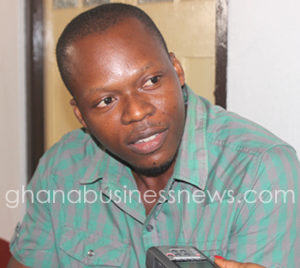How one young Ghanaian is using tourism to improve life for Persons with Disabilities

With an inspiration from a chorus in a patriotic song “we are all involved” buoyed by the support from siblings and friends, Joseph Asameni Obiri is making a difference in the lives of Persons with Disabilities (PWD’s).
The 29-year-old with a first degree in Hospitality and Tourism Management from the Ghana Institute of Management and Public Administration (GIMPA), through his company Lionize Tourism Consult has initiated a project which takes Person’s with Disabilities on tour for free.
In a country where adequate information and data on PWD’s is scarce and issues pertaining to their welfare are neglected, activities related to entertainment and tourism for these groups of people are unavailable, despite the fact that Ghana has a law to address these.
However, his organization seeks to fill that gap by organizing these groups of people and taking them out to places of interest both for educational and recreational purposes.
Obiri started out with his organization about eight years ago, but was engaged in the usual tourism services such as tour guiding, ticketing, airport pickups and hotel bookings.
The company went into hibernation for four years after it was established, within this period he focused on his education and worked in the tourism industry gathering extensive knowledge in the field.
With ten years of experience from the tourism industry, having worked in hotels, with car rental agencies, restaurant and night clubs he found out that the industry does not cater for the needs of people with disabilities.
This partly motivated him to currently focus his organization on PWD’s.
“I look at the 15 years Tourism Development Plan (2013 to 2027) which projects that there should be an increase in tourism inflows from the international market so I thought that the disabled group could add up to the numbers and I began researching about them,” he told ghanabusinessnews.com in an exclusive interview.
“I found interesting revelations, some of which shocked me. I went to the Ghana Tourism Authority ((GTA) and I found out that there’s no company organizing tours for PWD’s. I checked internationally and there was no such initiative in the West African sub-region, so it further ignited my passion to work on the initiative.”
The initiative called ‘Inclusive Tour’ is grouped into three: speech and hearing impaired group, intellectual disability which includes autism and delayed development and the physically challenged group, those who walk with crutches and use wheel chairs.
“To mark the World International Day for Disability last year, I successfully organized a tour for about 25 speech and hearing impaired people.
“I took them on tour to the Kwame Nkrumah Mausoleum, the Accra Central Library and West Hills Mall for free with funding from friends, parents and siblings who believe in my idea. It was an exciting moment for participants and they felt part of the society,” he added.
As you would expect, he takes keen interest on issues of PWD’s and would be organizing a second trip for them, this time for people suffering from intellectual disabilities on February 18 this year.
On his first tour, he observed that most of the places they visited were not disability friendly, the library for instance had no interpreters for these groups of people.
“Some of these public places were not disability friendly and there were no people to assist them around, making them uncomfortable.”
“When we got to some of the sites there were no sign language people and I wasn’t able to do sign language either so I felt very bad. Assuming it wasn’t a group and they were visiting these places on their own, who was going to assist them?” He asked.
He urged the government to support people with disabilities since they were part of society, adding, “The government should fix interpreters in public libraries to assist them “
With the intention of organizing these tours for free and a target of reaching the international market he called on government, philanthropists and well-meaning Ghanaians to support his initiative.
He expects support from the government and stakeholders as the numbers of participants grow.
“Staffing and weak customer services in restaurants, infrastructure and deplorable roads leading to tourist attraction sites are some of the challenges the tourism industry is faced with,” he said.
Obiri said although there is the Tourism Development Fund and tourism levies, the government and stakeholders in the tourism industry should ensure that monies allocated for these funds are used for the intended purposes.
“I want to see Ghana and West Africa grow to become the preferred tourist destination for Persons with Disabilities,” he said.
It is estimated that there are five million people living with disabilities in Ghana and 80 per cent of persons with disabilities live in developing countries.
By Pamela Ofori-Boateng
Copyright ©2017 by Creative Imaginations Publicity
All rights reserved. This article, or any portion thereof may not be reproduced or used in any manner whatsoever without the express written permission of the publisher except for the use of brief quotations in reviews.
The post How one young Ghanaian is using tourism to improve life
